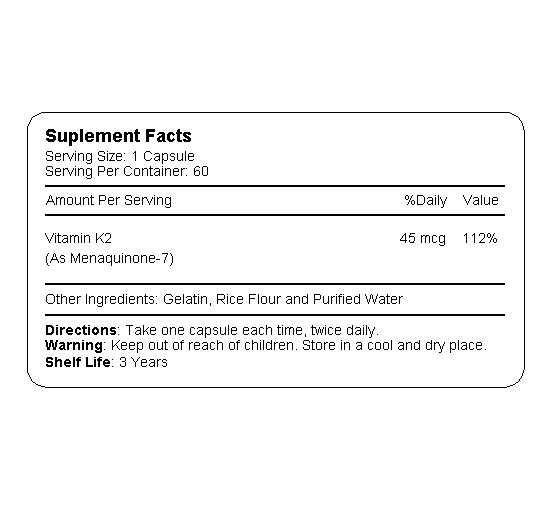Natto MK-7
Introduce
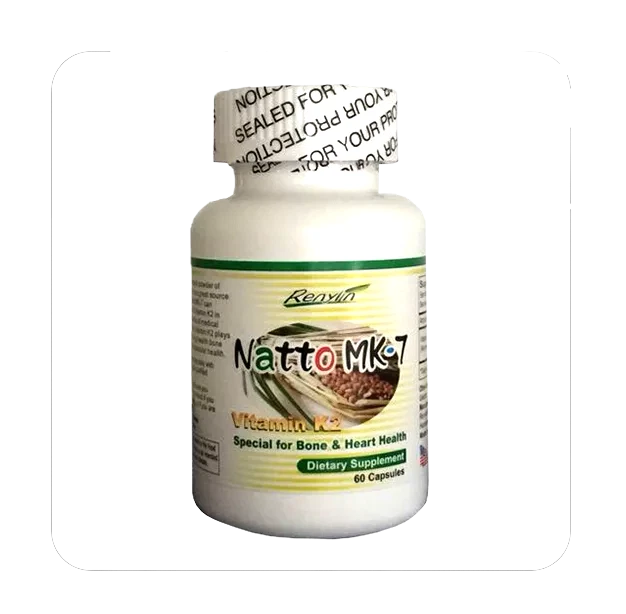
Vitamin K2 as menaquinone-7 (Mk-7) is one of the most bioavailable, longest lasting and most bioactive form of Vitamin K supplements.
For many years it was thought that vitamin K function was exclusively related to blood coagulation. However, over the past decade, Vitamin K2 especially has also been linked to two of the most important health issues: bone health and cardiovascular health.
Vitamin K, especially in the form of K2, helps calcium to get into the blood and bones where it belongs, and studies indicate that it potentially supports both bone mineral density and vascular elasticity within normal levels.*
Unfortunately, Western populations are deficient in K Vitamins as are required for healthy bones and cardiovascular tissues. This is especially troubling for children who have the greatest need for K2 for growing bones.
Vitamin K2 has been shown in laboratory experiments, populationbased studies and clinical trials to be much more effective than K1 in preventing bone loss and promoting bone integrity. Only vitamin K2 has been shown to significantly reduce the incidence of arterial calcification and promote cardiovascular health.*
This product is only for distributors and wholesalers
- *This statement has not been evaluated by the Food and Drug Administration. This product is not intended to diagnose, treat, cure or prevent any disease. The information provided on this site is intended for your general knowledge only and is not a substitute for professional medical advice or treatment for specific medical conditions.
Research
Here, you can read some of important published clinical research papers about MK-7 which support cardiovascular and bone health. Published peer reviewed studies can be accessed through PubMed at www.ncbi.nlm.nih.gov/pubmed. For more information, please contact Renylin Bio-Health Inc.
A High Intake of MK-7 Could Protect Against Coronary Heart Disease (CHD)
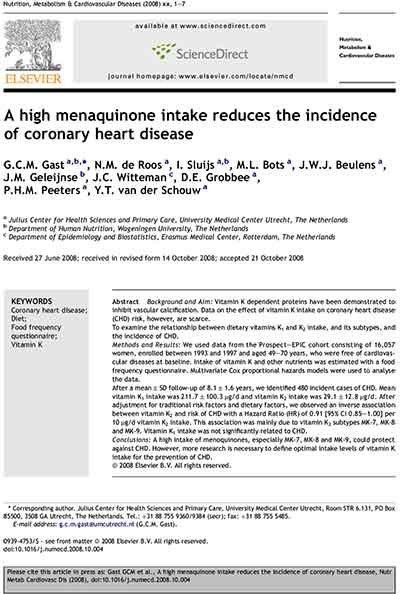
A high menaquinone intake reduces the incidence of
coronary heart disease
Abstract Background and Aim: Vitamin K dependent proteins have been demonstrated to inhibit vascular calcification. Data on the effect of vitamin K intake on coronary heart disease (CHD) risk, however, are scarce.
To examine the relationship between dietary vitamins K1 and K2 intake, and its subtypes, and the incidence of CHD.
Methods and Results: We used data from the ProspecteEPIC cohort consisting of 16,057 women, enrolled between 1993 and 1997 and aged 49e70 years, who were free of cardiovascular diseases at baseline. Intake of vitamin K and other nutrients was estimated with a food frequency questionnaire. Multivariate Cox proportional hazards models were used to analyse the data.
After a mean SD follow-up of 8.1 1.6 years, we identified 480 incident cases of CHD. Mean vitamin K1 intake was 211.7 100.3 mg/d and vitamin K2 intake was 29.1 12.8 mg/d. After adjustment for traditional risk factors and dietary factors, we observed an inverse association between vitamin K2 and risk of CHD with a Hazard Ratio (HR) of 0.91 [95% CI 0.85e1.00] per 10 mg/d vitamin K2 intake. This association was mainly due to vitamin K2 subtypes MK-7, MK-8 and MK-9. Vitamin K1 intake was not significantly related to CHD.
Conclusions: A high intake of menoquinones, especially MK-7, MK-8 and MK-9, could protect against CHD. However, more research is necessary to define optimal intake levels of vitamin K intake for the prevention of CHD.
Source:j.numecd.2008.10.004
Adequate Intake of Menaquinone Could Be Important For CHD Prevention
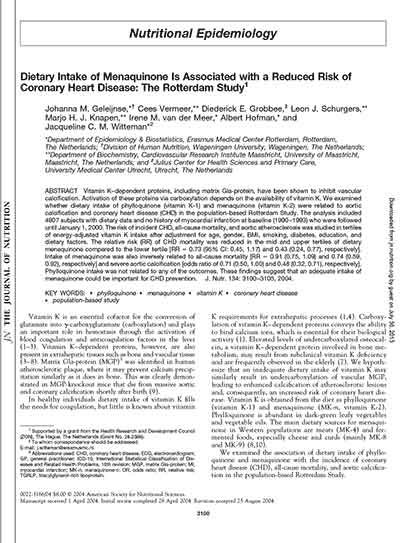
Dietary Intake of Menaquinone Is Associated with a Reduced Risk of Coronary Heart Disease: The Rotterdam Study
ABSTRACT
Vitamin K–dependent proteins, including matrix Gla-protein, have been shown to inhibit vascular calcification. Activation of these proteins via carboxylation depends on the availability of vitamin K. We examined whether dietary intake of phylloquinone (vitamin K-1) and menaquinone (vitamin K-2) were related to aortic calcification and coronary heart disease (CHD) in the population-based Rotterdam Study. The analysis included 4807 subjects with dietary data and no history of myocardial infarction at baseline (1990–1993) who were followed until January 1, 2000. The risk of incident CHD, all-cause mortality, and aortic atherosclerosis was studied in tertiles of energy-adjusted vitamin K intake after adjustment for age, gender, BMI, smoking, diabetes, education, and dietary factors. The relative risk (RR) of CHD mortality was reduced in the mid and upper tertiles of dietary menaquinone compared to the lower tertile [RR = 0.73 (95% CI: 0.45, 1.17) and 0.43 (0.24, 0.77), respectively]. Intake of menaquinone was also inversely related to all-cause mortality [RR = 0.91 (0.75, 1.09) and 0.74 (0.59, 0.92), respectively] and severe aortic calcification [odds ratio of 0.71 (0.50, 1.00) and 0.48 (0.32, 0.71), respectively]. Phylloquinone intake was not related to any of the outcomes. These findings suggest that an adequate intake of menaquinone could be important for CHD prevention.
Source:J Nutr. 2004 Nov;134(11):3100-5. https://www.ncbi.nlm.nih.gov/pubmed/15514282
Matrix Gla-Protein: The Calcification Inhibitor In Need of Vitamin K
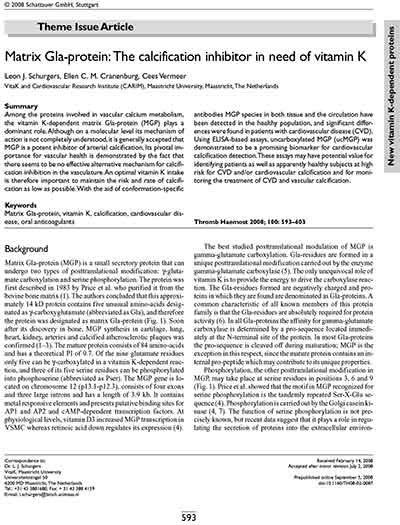
Matrix Gla-protein: The calcification inhibitor in need of vitamin K
Summary
Among the proteins involved in vascular calcium metabolism, the vitamin K-dependent matrix Gla-protein (MGP) plays a dominant role.Although on a molecular level its mechanism of action is not completely understood,it is generally accepted that MGP is a potent inhibitor of arterial calcification. Its pivotal importance for vascular health is demonstrated by the fact that there seems to be no effective alternative mechanism for calcification inhibition in the vasculature.An optimal vitamin K intake is therefore important to maintain the risk and rate of calcification as low as possible.With the aid of conformation-specific antibodies MGP species in both tissue and the circulation have been detected in the healthy population, and significant differences were found in patients with cardiovascular disease (CVD). Using ELISA-based assays, uncarboxylated MGP (ucMGP) was demonstrated to be a promising biomarker for cardiovascular calcification detection.These assays may have potential value for identifying patients as well as apparently healthy subjects at high risk for CVD and/or cardiovascular calcification and for monitoring the treatment of CVD and vascular calcification.
Source:Thromb Haemost. 2008 Oct;100(4):593-603. https://www.ncbi.nlm.nih.gov/pubmed/18841280<>
MK-7 Relation to Japanese Hip Fracture
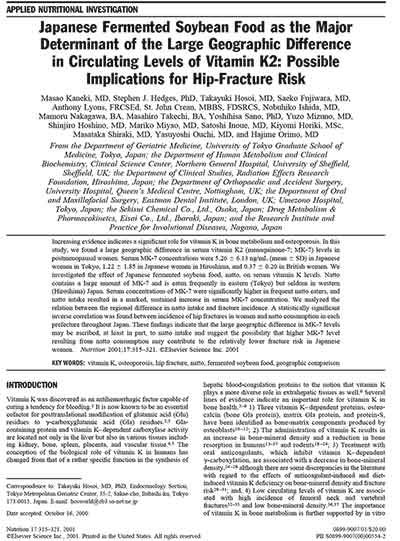
Japanese fermented soybean food as the major determinant of the large geographic difference in circulating levels of vitamin K2: possible implications for hip-fracture risk.
Abstract
Increasing evidence indicates a significant role for vitamin K in bone metabolism and osteoporosis. In this study, we found a large geographic difference in serum vitamin K2 (menaquinone-7; MK-7) levels in postmenopausal women. Serum MK-7 concentrations were 5.26 +/- 6.13 ng/mL (mean +/- SD) in Japanese women in Tokyo, 1.22 +/- 1.85 in Japanese women in Hiroshima, and 0.37 +/- 0.20 in British women. We investigated the effect of Japanese fermented soybean food, natto, on serum vitamin K levels. Natto contains a large amount of MK-7 and is eaten frequently in eastern (Tokyo) but seldom in western (Hiroshima) Japan. Serum concentrations of MK-7 were significantly higher in frequent natto eaters, and natto intake resulted in a marked, sustained increase in serum MK-7 concentration. We analyzed the relation between the regional difference in natto intake and fracture incidence. A statistically significant inverse correlation was found between incidence of hip fractures in women and natto consumption in each prefecture throughout Japan. These findings indicate that the large geographic difference in MK-7 levels may be ascribed, at least in part, to natto intake and suggest the possibility that higher MK-7 level resulting from natto consumption may contribute to the relatively lower fracture risk in Japanese women.
Source: Nutrition. 2001 Apr;17(4):315-21 www.ncbi.nlm.nih.gov/pubmed/11369171
MK-7 Prevention of Bone Deterioration With Aging
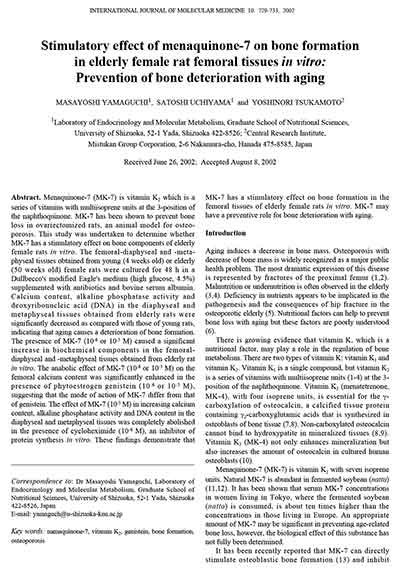
Stimulatory effect of menaquinone-7 on bone formation in elderly female rat femoral tissues in vitro: prevention of bone deterioration with aging.
Abstract
Menaquinone-7 (MK-7) is vitamin K2 which is a series of vitamins with multi-isoprene units at the 3-position of the naphthoquinone. MK-7 has been shown to prevent bone loss in ovariectomized rats, an animal model for osteoporosis.
This study was undertaken to determine whether MK-7 has a stimulatory effect on bone components of elderly female rats in vitro. The femoral-diaphyseal and -metaphyseal tissues obtained from young (4 weeks old) or elderly (50 weeks old) female rats were cultured for 48 h in a Dullbecco's modified Eagle's medium (high glucose, 4.5%) supplemented with antibiotics and bovine serum albumin.
Calcium content, alkaline phosphatase activity and deoxyribonucleic acid (DNA) in the diaphyseal and metaphyseal tissues obtained from elderly rats were significantly decreased as compared with those of young rats, indicating that aging causes a deterioration of bone formation.
The presence of MK-7 (10-6 or 10-5 M) caused a significant increase in biochemical components in the femoral-diaphyseal and -metaphyseal tissues obtained from elderly rat in vitro. The anabolic effect of MK-7 (10-6 or 10-5 M) on the femoral calcium content was significantly enhanced in the presence of phytoestrogen genistein (10-6 or 10-5 M), suggesting that the mode of action of MK-7 differ from that of genistein. The effect of MK-7 (10-5 M) in increasing calcium content, alkaline phosphatase activity and DNA content in the diaphyseal and metaphyseal tissues was completely abolished in the presence of cycloheximide (10-6 M), an inhibitor of protein synthesis in vitro. These findings demonstrate that MK-7 has a stimulatory effect on bone formation in the femoral tissues of elderly female rats in vitro. MK-7 may have a preventive role for bone deterioration with aging.
Source: INTERNATIONAL JOURNAL OF MOLECULAR MEDICINE 10: 729-733, 2002
Vitamin K2 In The Prevention of Hepatocellular Carcinoma In Women With Viral Cirrhosis
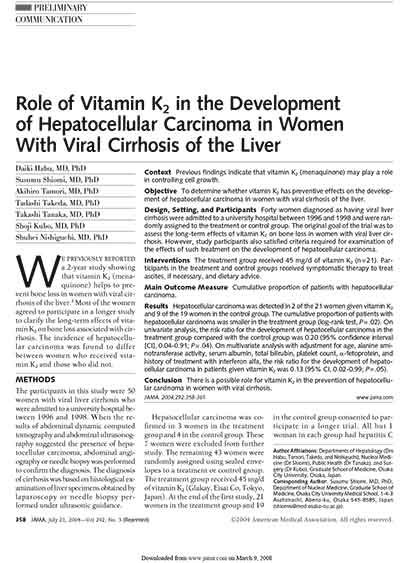
Role of Vitamin K2 in the Development of Hepatocellular Carcinoma in Women With Viral Cirrhosis of the Liver
Context Previous findings indicate that vitamin K2 (menaquinone) may play a role in controlling cell growth.
Objective To determine whether vitamin K2 has preventive effects on the development of hepatocellular carcinoma in women with viral cirrhosis of the liver.
Design, Setting, and Participants Forty women diagnosed as having viral liver cirrhosis were admitted to a university hospital between 1996 and 1998 and were randomly assigned to the treatment or control group. The original goal of the trial was to assess the long-term effects of vitamin K2 on bone loss in women with viral liver cirrhosis. However, study participants also satisfied criteria required for examination of the effects of such treatment on the development of hepatocellular carcinoma.
Interventions The treatment group received 45 mg/d of vitamin K2 (n=21). Participants in the treatment and control groups received symptomatic therapy to treat ascites, if necessary, and dietary advice.
Main Outcome Measure Cumulative proportion of patients with hepatocellular carcinoma.
Results Hepatocellular carcinoma was detected in 2 of the 21 women given vitamin K2 and 9 of the 19 women in the control group. The cumulative proportion of patients with hepatocellular carcinoma was smaller in the treatment group (log-rank test, P=.02). On univariate analysis, the risk ratio for the development of hepatocellular carcinoma in the treatment group compared with the control group was 0.20 (95% confidence interval [CI], 0.04-0.91; P=.04). On multivariate analysis with adjustment for age, alanine aminotransferase activity, serum albumin, total bilirubin, platelet count, -fetoprotein, and history of treatment with interferon alfa, the risk ratio for the development of hepatocellular carcinoma in patients given vitamin K2 was 0.13 (95% CI, 0.02-0.99; P=.05). Conclusion There is a possible role for vitamin K2 in the prevention of hepatocellular carcinoma in women with viral cirrhosis.
Source: JAMA. 2004;292:358-361
Vitamin K2: Putting Calcium Where It Belongs
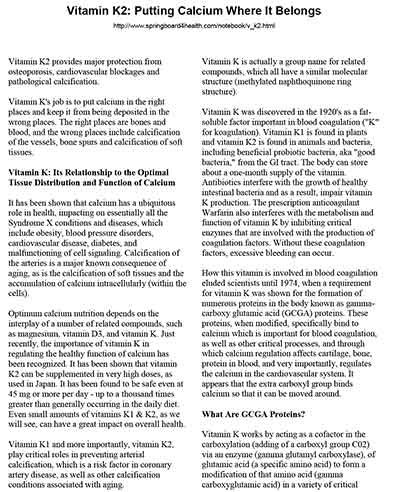
Vitamin K2: Putting Calcium Where It Belongs
Vitamin K2 provides major protection from osteoporosis, cardiovascular blockages and pathological calcification.
Vitamin K’s job is to put calcium in the right places and keep it from being deposited in the wrong places. The right places are bones and blood, and the wrong places include calcification of the vessels, bone spurs and calcification of soft tissues.
Source: http://www.springboard4health.com/notebook/v_k2.html
FAQs
MK-7(Menaquinone 7) is one of subtypes of vitamin K2 found in fermented foods. Vitamin K2 as menaquinone-7 (Mk-7) is one of the most bioavailable, longest lasting and most bioactive form of Vitamin K supplements.
For many years it was thought that vitamin K function was exclusively related to blood coagulation. However, over the past decade, Vitamin K2 especially has also been linked to two of the most important health issues: bone health and cardiovascular health.
Vitamin K2 as menaquinone-7 (Mk-7) helps calcium to get into the blood and bones where it belongs, and studies indicate that it potentially supports both bone mineral density and vascular elasticity within normal levels.*
One of the simplest ways to explain the importance of vitamin K2 is to say it has two basic and crucial functions, again, having to do with cardiovascular health and bone restoration. It helps prevent osteoporosis and hardening of the arteries, or atherosclerosis. and several other valuable things, including:
- Directing calcium to places like your bones, making them stronger, and your teeth to help prevent cavities. It also prevents calcium from going to the wrong areas, such as to your kidneys, where it could lead to kidney stones, or your blood vessels, where it could trigger heart disease.
- Optimizing sexual function by increasing testosterone and fertility in men, and decreasing androgens, the male hormones, in women with polycystic ovarian syndrome (PCOS)
- Creating insulin to stabilize your blood sugar (keeping your system sensitive to maintaining correct amounts), protecting against diabetes and helping to prevent metabolic problems associated with obesity
- Suppressing genes that can promote cancer while strengthening genes that promote healthy
- Enhancing your ability to utilize energy as you exercise improving overall performance
According to a Dutch study, matrix Gla Protein (MGP), a protein that relies on vitamin K2, is the most potent natural inhibitor of calcification there is, but it requires activation. Vitamin K2.org explains:
"When the body has adequate vitamin K2 (specifically as menaquinone-7, or MK-7, as it is the most biologically active and available form of vitamin K2), MGP repels calcium from depositing in the arteries and blood vessels, returning it to the bloodstream so it can be utilized by other systems, such as building strong, dense bones."
A study in Rotterdam involving 4,809 Dutch adults determined that those with the highest vitamin K2 intake had fewer heart attacks, a lower aortic calcification risk and the lowest death rate, altogether. That's one reason why naturopathic doctor and author Tal Friedman recommends taking vitamin K2 supplements, particularly MK-7.*
1. Cardiovascular Health:
Vascular calcification is highly associated with cardiovascular disease mortality, particularly in high risk patients with diabetes and chronic kidney diseases (CKD). Vascular calcification leads to increased vascular stiffness and reduced vascular compliance. For many decades, vascular calcification has been noted as a consequence of aging. Studies now confirm that vascular calcification is an actively regulated process. Matrix Gla Protein (MGP) is one of the strongest inhibitors of arterial calcification. MGP has a high affinity binding to calcium ions. The protein plays a role in reverse of arterial calcificayion by binding calcium ions and taking them out from vascular wall. But the inhibitor is vitamin-K2 dependent and need to be actived at presence of vitamin K2. Vitamin K2 activates matrix GLA protein (MGP), which inhibits the deposits of calcium on the blood-vessel walls.*
2.Bone Health:
Osteoblasts produce osteocalcin, which helps take calcium from the blood circulation and bind it to the bone matrix. In part, osteocalcin influences bone mineralization through its ability to bind to the mineral component of bone, hydroxyapatite, which in turn makes the skeleton stronger and less susceptible to fracture. The newly made osteocalcin, however, is inactive, and it needs vitamin K2 to become fully activated and bind calcium.That requirement alone makes vitamin K2 a major player in bone health, but its importance does not stop there. Vitamin K2 also keeps calcium from accumulating in the walls of blood vessels.*
The concept of calcification inhibition by high vitamin K intake was confirmed in experimental animals. In this model the efficacy of vitamins K1 and K2 in preventing arterial calcification was compared. It was found that K2 completely inhibited tissue calcification, whereas a similar or even an eight-fold higher dose of K1 had no measurable effect.
Source:Spronk HM, et al. Tissue-specific utilization of menaquinone-4 results in the prevention of arterial calcification in warfarin-treated rats. J Vasc Res 2003; 40:531–537.
- *This statement has not been evaluated by the Food and Drug Administration. This product is not intended to diagnose, treat, cure or prevent any disease. The information provided on this site is intended for your general knowledge only and is not a substitute for professional medical advice or treatment for specific medical conditions.




